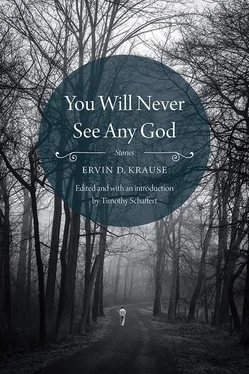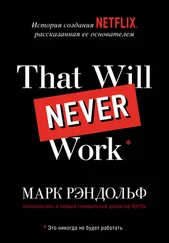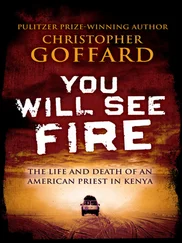Ervin D. StorKrauseies
You Will Never See Any God: Stories
Over the years, Ervin Krause’s family and friends remained fiercely committed to the author’s memory and the work he left behind. We should all be so lucky to have such a devoted village of archivists. Most significant among them has been Loretta Krause, my dear friend and research partner. Loretta not only saved notebooks, drafts, and correspondence but has generously shared her memories of Ervin from their life together. I’m extremely grateful for Loretta’s kindness, humor, and spirit.
I’m also grateful for the time and attention that Marlene and Hank Krause have given to the project and the archives they’ve maintained — material that dates back to Ervin’s high school years. And it’s been a great pleasure to learn more about Ervin through his close friend and colleague Richard Goodman.
Special thanks to Kristen Elias Rowley of the University of Nebraska Press for her shepherding of this project. Ted Kooser has provided key perspective on the period and Karl Shapiro’s role in Ervin’s work. And many thanks to Susan Belasco for her support and encouragement.
Thanks also to Kurt Andersen, David Manderscheid, Judy Slater, Wendy Katz, Kay Walter, Leta Powell Drake, Amber Antholz, Hilda Raz, Owen King, and Rhonda Sherman. And special thanks to Rodney Rahl for his insights and his enthusiasm for all my various literary endeavors.
This collection celebrates the tradition of the small literary journal and its decades-long commitment to the short-story writer. Some of the stories in this collection first appeared in Prairie Schooner (“The Right Hand,” “The Metal Sky,” “The Quick and the Dead,” “The Snake”) and Northwest Review (“The Shooters,” “The Witch”). The O. Henry Awards prize stories anthology reprinted “The Quick and the Dead” and “The Snake.” Other of Krause’s stories appeared in University Review — Kansas City, Literary Review, New Letters , and College English .
In the stories of Ervin Krause, men and women are often unforgiving of each other’s trespasses. But their fiercest grudges are with the land and the sky. The characters are troubled by floods and parched earth, battered by “vivid, hurting” snow and intense summer sun. Sometimes nature wins in these struggles and sometimes humans do, but in Krause’s fiction it’s never a fair fight, and it’s often brutal.
In one of Krause’s most heart-wrenching and terrifying passages, in “The Metal Sky,” a farmer examines the intricate beauty and flight of a butterfly as he struggles to stay alive after an accident. Pinned, bleeding, beneath his own machinery, he seeks companionship in death while also envying the insect’s light-as-air indifference:
He brought his fingers up and then very carefully and quickly snapped the fingers shut on the arched yellow wings. The butterfly struggled, but its wings were caught and its fragile black body vibrated in its writhings. The yellow dust on the wings rubbed off and filtered down, lightly.
It will know I am not dead, the man thought. It alone, if nothing else, will know. He held the fragile wings of yellow light, with the wings so delicate he could not even feel them between his hardened hands. The butterfly tried to move and could not and the claws of its legs clasped the air.
Had Krause lived to write longer, to write more, we would almost certainly have come to have a sense of the Krausian —fiction characterized by the stark, haunting poetry of his language, the treachery of his landscapes, the moral and fatal failings of his unblessed characters. His stories are tantalizing portraits of sad hamlets surrounded by fields of failed crops and rising rivers, grim little worlds as gritty as the settings of pulp crime. These stories aren’t so much about survival as they are about the characters’ determination to outlive all the other hard-living men and women around them.
Though his stories are told without sentiment, with all of pulp’s electric tension and lack of mercy, they nonetheless have the gentle but insistent rhythms of folktale. There’s life, then there’s death. These are tales that command retelling; they’re cautionary, while inviting you to perversely delight in every character’s every reckless act. The stories play on our memories of shadowy figures and childhood fears, the countryside peopled with witches and skinflints, the nights prowled by wolves and scrutinized by an “agonized and lamenting” moon. And above all, a legendary bad luck plagues the characters’ minor lives.
“There was nothing dead that was ever beautiful,” considers the farmer of “The Metal Sky” in a last stab at philosophizing, as he perishes beneath a fallen tractor, unfound, unnoticed, in a field to which he has dedicated his life.
Some of this country squalor Krause knew by heart, having grown up in poverty, among tenant farmers. The Krauses moved from plot to plot across Nebraska and Iowa in the years immediately following the Depression. Krause’s fiction depicts lives and fates he strove to avoid. His characters pontificate in saloons, condemning the morals of others as they slowly get sloshed; his men and women have extramarital affairs in old cars on winter nights; they traffic in gossip, terrorize their neighbors; they steal, they hunt, they spy. A child’s innocent curiosity can turn sinister in a minute — children see things too terrible too soon. These are stories of crimes big and small, with no law in sight.

While Krause’s characters contended with all sorts of demons, both within and without, Krause himself grew up under the strong moral guidance of Lutheran parents. Krause was born in Arlington, Nebraska, on June 22, 1931, to German Russian immigrants and grew up with four brothers. When he was fifteen, “his father fell paralyzed from a stroke,” writes Joseph Backus, a friend of Krause’s and an early devotee of his fiction, “to linger six years unable to speak, only listening as Erv would sit and read to him. But great purpose and principle drove the boys’ mother, who kept them in line with knuckle-thunks to the head or the tweak of an ear.”
Old Moder, as the boys’ mother was known, was not old at all. But stout and sturdy, her hair pulled back tight, she was an intimidating presence. She instilled in her young men a respect for education, but she seems also to have inspired a great sense of urgency — they studied hard, they went to college, they excelled in their professions. One son became an aeronautical engineer, one a professional baseball scout, one a doctor, one a farmer. Ervin proved both poetically and mechanically minded; a popular family legend has it that he was so expert in his high school science classes that the school never had to hire a substitute — Krause readily stepped in to instruct whenever the teacher was out. While pursuing his bachelor’s degree in physics and math at Iowa State University, he contributed fiction and poetry to the school’s literary journal.
In between his bachelor’s degree and graduate school, Krause worked as a technical writer for MacDonald Aircraft in St. Louis and served eighteen months in the Air Force, stationed in England. Krause entered the master’s program in English at the University of Nebraska — Lincoln in 1956, the same year that poet Karl Shapiro took the reins of Prairie Schooner , the venerable literary quarterly that has been published by the English Department since its first issue in 1927.
Читать дальше












